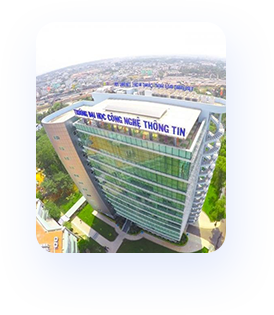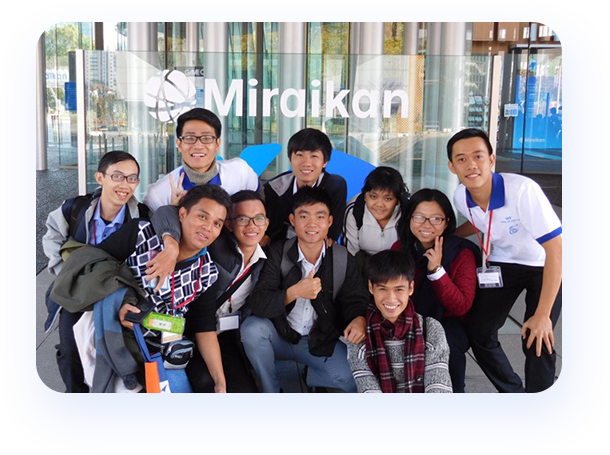(For foreign students)
2. Information Systems
3. Computer Science
4. Software Engineering
5. Computer Engineering
6. Computer Networks &
Data Communications
7. Information Security
8. E - Commerce
9. Data Science
10. Artificial Intelligence

2. Faculty of Computer Science
3. Faculty of Software Engineering
4. Faculty of Computer Networks & Communications
5. Faculty of Information Systems
6. Faculty of Information Science and Engineering
| No. | Course ID | Course tittle | Faculty | Credit |
| 1 | NT118 | Mobile Application Development | Computer Networks and Communications | 3 |
| 2 | NT105 | Data communications | Computer Networks and Communications | 4 |
| 3 | NT532 | Advanced Internet of Things Technologies | Computer Networks and Communications | 3 |
| 4 | NT132 | Network and system administration | Computer Networks and Communications | 4 |
| 5 | NT219 | Cryptography | Computer Networks and Communications | 3 |
| 6 | CE118 | Digital Logic Design | Computer Engineering | 4 |
| 7 | CE103 | Microprocessor and microprocessor | Computer Engineering | 4 |
| 8 | CE222 | Digital Integrated Circuit Design | Computer Engineering | 4 |
| 9 | CE224 | Embedded system design | Computer Engineering | 4 |
| 10 | CE213 | Digital System Design with HDL | Computer Engineering | 4 |
| 11 | IS2 | Data Mining | Information Systems | 4 |
| 12 | IS403 | Data Analysis in Business | Information Systems | 3 |
| 13 | CS106 | Artificial intelligence | Computer Science | 4 |
| 14 | CS5423 | Principles of database systems | Computer Science | 4 |
| 15 | CS4283 | Computer network | Computer Science | 3 |
| 16 | MSIS2433 | Object Oriented Programming | Information Systems | 3 |
| 17 | CS4323 | Design and Implementation of Operating system | Information Systems | 3 |
| 18 | CS4273 | Software Engineering | Information Systems | 4 |
| 19 | CS3443 | Computer Systems | Information Systems | 3 |
| 20 | CS4343 | Data structures and algorithms | Information Systems | 4 |
| 21 | STAT3013 | Intermediate Statistical Analysis | Information Systems | 3 |
| 22 | MSIS207 | Web Applications Development | Information Systems | 4 |
| 23 | IEM5723 | Data, Process and Object Modeling | Information Systems | 3 |
| 24 | CS5433 | Distributed database systems | Information Systems | 3 |
| 25 | CS4243 | Algorithms and Processes in comp-security | Information Systems | 3 |
| 26 | MSIS402 | Cloud computing | Information Systems | 3 |
| 27 | CS3653 | Discrete Mathematics for computer | Computer Science | 3 |
| 28 | STAT4033 | Statistics | Information Systems | 3 |
| 29 | MSIS5723 | System Analysis and Design | Information Systems | 4 |
| 30 | MSIS4013 | Database system design, management and administration | Information Systems | 3 |
| 31 | MSIS3303 | System Analysis and Design | Information Systems | 4 |
| 32 | MSIS3033 | Information Systems Project Management | Information Systems | 3 |
| 33 | ACCT5123 | Enterprise Resource Planning | Information Systems | 3 |
| 34 | MSIS405 | Big data | Information Systems | 3 |
| 35 | MKTG5883 | Advanced Data Mining Applications | Information Systems | 4 |
| 36 | MSIS4263 | Decision support and business intelligence applications | Information Systems | 3 |
| 37 | CS4153 | Mobile Applications Development | Computer Science | 3 |
| * SUBJECTS OPENED FOR THE JOINT PROGRAM WITH BIRMINGHAM CITY UNIVERSITY | ||||
| No. | Course ID | Course tittle | Faculty | Credit |
| 1 | CSBU101 | Computer Programming | Computer Science | 20 |
| 2 | CSBU102 | Computer Systems | Computer Science | 20 |
| 3 | CSBU103 | Website Design and Development | Computer Science | 20 |
| 4 | CSBU104 | Data Structures and Algorithms | Computer Science | 20 |
| 5 | CSBU105 | Network Fundamentals | Computer Science | 20 |
| 6 | CSBU106 | Innovation Project | Computer Science | 20 |
| 7 | CSBU107 | Object Oriented Programming | Computer Science | 20 |
| 8 | CSBU108 | Operating Systems | Computer Science | 20 |
| 9 | CSBU109 | Database and Web Application Development | Computer Science | 20 |
| 10 | CSBU110 | Discrete Mathematics and Declarative Programming | Computer Science | 20 |
| 11 | CSBU111 | Cyber Security | Computer Science | 20 |
| 12 | CSBU112 | Software Design | Computer Science | 20 |
Both the Guest House and Dormitory B are within walking distance (4 km). Public transport is also available by taking bus number 33, 53, 99 (waiting time: 4 - 20 mins). Costs of room’s types in Dormitory B are very affordable. Room for 8 students ranges from 6 USD to 9 USD; Room for 6 students ranges from 8 USD to 12 USD; Room for 4 students ranges from 19 USD to 37 USD; Room for 2 students ranges from 36 USD to 73 USD (electricity, water, and other services not included)*.
For students who want well-equipped rooms, a Guest House is another option. For 02 student, price is 270 USD/ month; for 4 students, price is 350 USD/month (electricity, water, Wifi included)*
The exchange program is open to all students from our partner institutions (listed below) who meet the English language requirements, as well as other criteria depending on the faculty and/or program. Students must be in good academic standing.
English language requirements: Students must satisfy English language proficiency: TOEIC score of 400+ or equivalent.
* All of the above fee and cost are estimated only and may change overtime.
* Exchange rate: 1 USD = 26.000 VNĐ
A study visa (DH code) is mandatory for international exchange students at UIT. Please note that the visa processing time is typically around 01 month from the date of submitting your complete application to the Immigration Department HCMC.
Detailed information is available at https://qhdn.uit.edu.vn/en/visa-info
(For UIT students)
There is so much to learn beyond the classroom and going on student exchange programs. UIT will give you the opportunity to choose from prestigious international institutions around the globe. These exchange opportunities provide both undergraduate and graduate students with the opportunity to take core or elective courses at any of our partner institutions, as non-degree students.
No matter where or for how long you go, learning abroad will shape you and how you see and relate to the world. Gain exposure to different cultures, backgrounds, and forms of teaching.
Students should start preparing at least one year in advance. For example, to study in Fall 2025, you should start applying to foreign universities by the end of 2024.
"Specific deadlines vary by university. Each university has its own deadlines for applications and other requirements. It is the student's responsibility to check the university's website and make sure they meet all deadlines.
All UIT students are eligible to participate in Student Exchange programs with any partner university. This applies to all majors and subjects, as long as the course is open to international students, partner universities are accepting international students during that semester, and the partner universities accept the student's application. UIT students are encouraged to explore courses in a variety of subjects, including Art, Philosophy, and others.
However, it is the student's responsibility to decide which courses to take and at which university. Students can consult with their academic advisor or their Faculty for guidance on course selection. The Faculty will also determine which courses will count towards the student's degree program.
The External Relations Office does not provide course or university recommendations. The External Relations Office does not have the expertise to provide specific advice on courses or partner universities, as we have not visited the partner universities on their campus.
Costs and Expenses:
- Tuition Fees: Generally, most student exchange programs will waive tuition fees for UIT students studying at partner universities. However, there may be some minor fees that UIT students must pay directly to the partner universities (such as course registration fees), as stipulated by the partner universities' regulations, but these are usually very small.
- Living Expenses: UIT students are fully responsible for their own living expenses, including food, accommodation, transportation, insurance, etc. Some institutions or countries may offer scholarships to partially cover these costs (e.g., SEED scholarships at Canadian universities).
- Airfare: UIT students must fully cover their own airfare between UIT and the partner institution.
Immigration Law: UIT students must independently research and comply with all relevant laws, including those pertaining to entry, exit, and immigration related to student exchange in host countries, as well as regulations concerning the carrying of cash across borders.
Experiencing different styles of education will enhance learning quality and will expose you to fresh perspectives – be it an elective, a research project or a core course.
Live beyond your borders!

● Learning to connect with people from different cultures leads to quicker adaptation and success in new environments.
● Intercultural competencies will help you manage the challenges of a global workplace.
● International experiences cultivate cultural and interpersonal understanding and help build more effective communication skills.
● Speaking multiple languages builds higher-level cognitive abilities












